5 Skin Problems in German Shepherds and How to Identify Them Early
German Shepherds are known for their thick coats, which can sometimes lead to skin problems. These issues might cause discomfort and affect their overall health if left untreated.
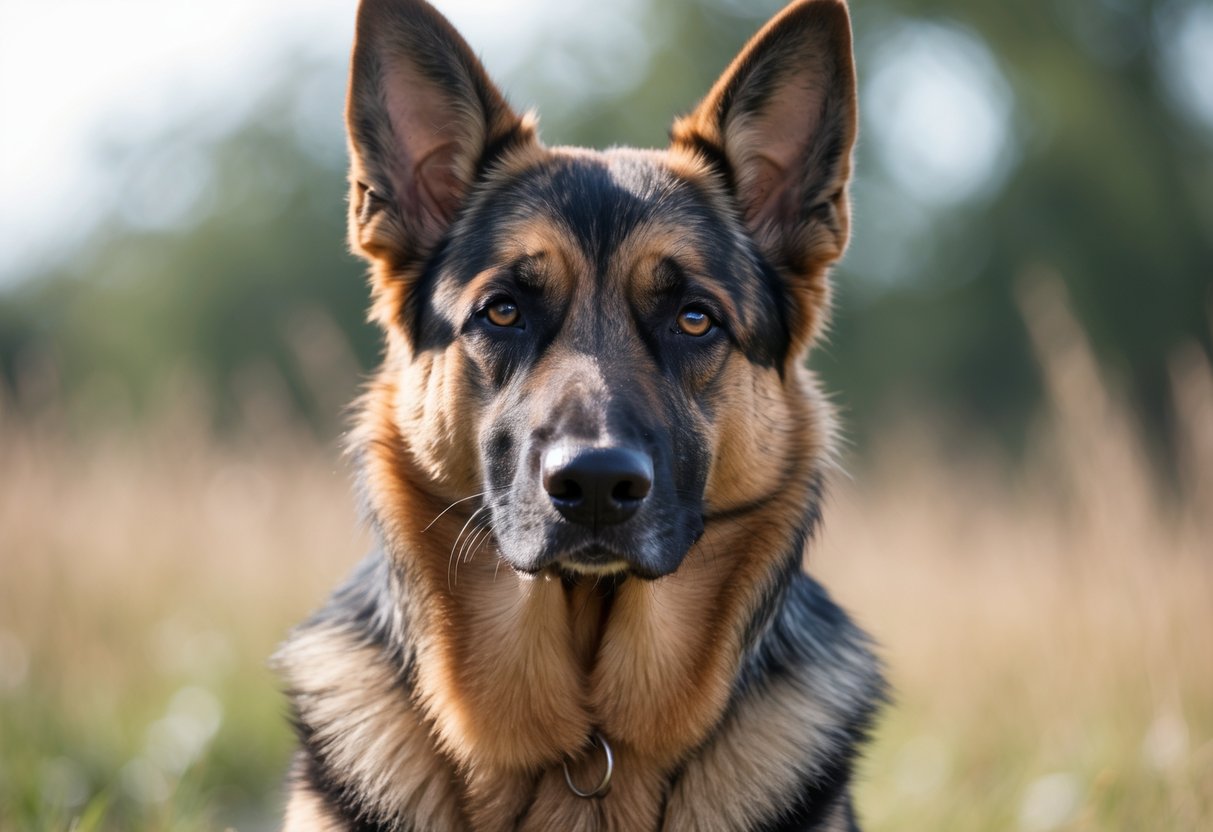
Understanding common skin problems in German Shepherds helps owners spot signs early and take proper care. Knowing what to watch for and how to respond can keep the dog comfortable and healthy.
1) Pyoderma: bacterial skin infection causing pustules and inflammation

Pyoderma is a common bacterial skin infection in German Shepherds. It causes red, inflamed skin and pustules, which are small pus-filled bumps. Dogs with pyoderma often show discomfort and may scratch or lick the affected areas.
This condition often develops when the skin is damaged or weakened. Allergies, parasites, or moisture trapped in skin folds can make it easier for bacteria to grow. German Shepherds are prone to deep pyoderma because of their thick coat and skin traits.
Treatment usually involves antibiotics and special shampoos to reduce bacteria. Cleaning the skin and controlling underlying problems like allergies are important steps. If not treated, pyoderma can worsen and spread, causing more irritation and potential hair loss.
Good grooming and skin care can help prevent pyoderma. Regular checks for redness or sores allow early detection. Keeping the dog’s skin dry and clean reduces the risk of infection.
2) Allergic dermatitis from environmental or food allergens

German Shepherds can develop allergic dermatitis from exposure to environmental or food allergens. This condition causes the skin to become red, itchy, and inflamed. It often leads to discomfort and may result in hair loss or rashes.
Common environmental allergens include pollen, dust mites, mold, and household chemicals. These substances can irritate the skin or cause an immune reaction. Food allergies usually involve certain proteins, such as chicken, beef, or grains.
When a German Shepherd has allergic dermatitis, signs may include frequent scratching, licking, or biting of the skin. The ears and paws are common areas to show symptoms. Repeated irritation can sometimes lead to infection or other skin problems.
Managing allergic dermatitis involves identifying and avoiding triggers when possible. A vet may recommend special diets or medications to reduce inflammation. Regular baths and skin care routines can help soothe symptoms and protect the coat.
Early detection and treatment are important to keep the skin healthy. Monitoring a dog’s behavior and skin condition can help spot problems before they get worse.
3) Hot spots: acute moist dermatitis causing localized irritation
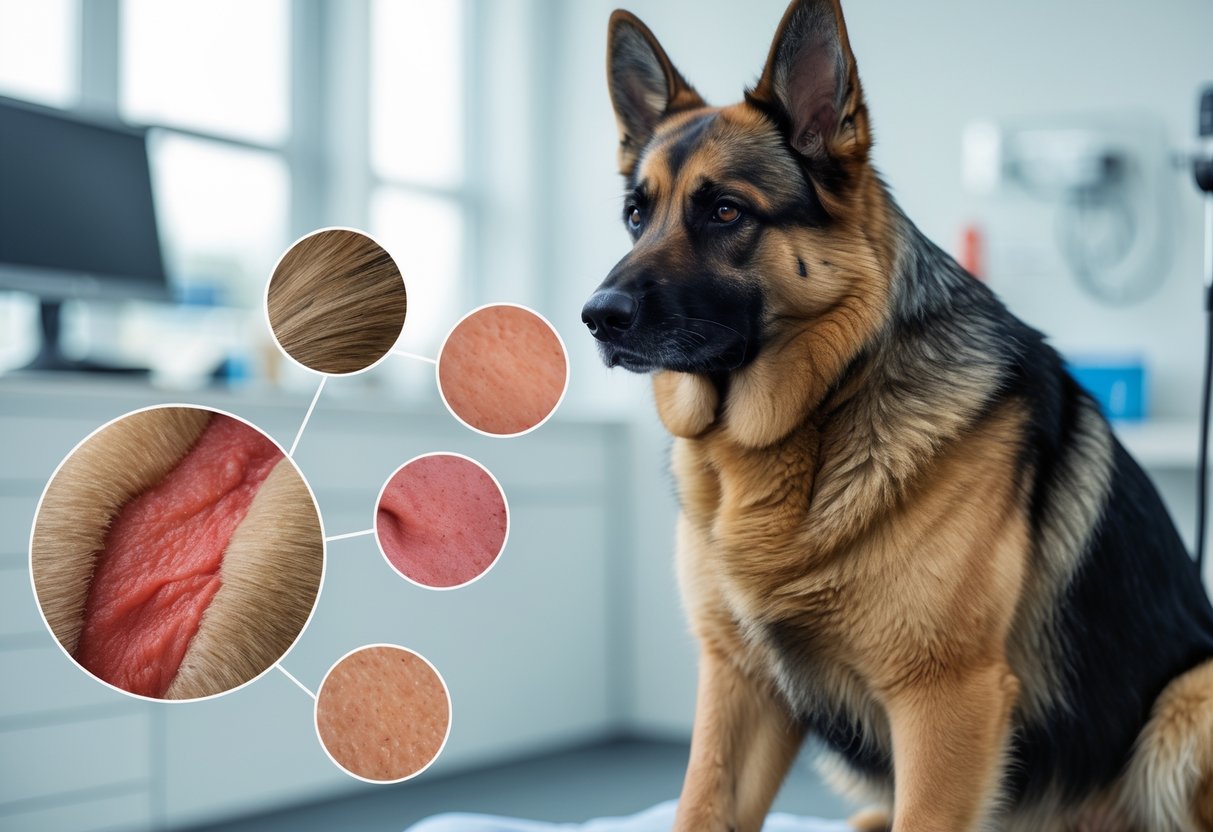
Hot spots, also known as acute moist dermatitis, are common skin problems in German Shepherds. These spots appear as red, swollen, and moist areas that can develop quickly. They are often painful and itchy for the dog.
The irritated skin may ooze pus or have a strong odor. Hot spots usually form when a dog scratches or licks a small injury or bug bite, causing the area to become infected. They can happen anywhere on the body but are often found on the head, legs, and hips.
If left untreated, hot spots can grow rapidly and become more severe. Treatment includes cleaning the area, stopping the dog from scratching, and sometimes using antibiotics or medicated creams. Preventing hot spots involves regular grooming, checking for parasites, and keeping the skin clean and dry.
4) Mange: mite infestation leading to intense itching and hair loss

Mange is a skin condition caused by tiny mites that live on or under the skin. These mites cause intense itching, hair loss, and skin irritation in German Shepherds.
There are two main types of mange. Sarcoptic mange is highly contagious and causes severe itching. Demodectic mange is less contagious but can cause hair loss and skin inflammation.
If mange is left untreated, it can lead to secondary infections and more serious skin problems. Early detection and treatment are important to prevent worsening symptoms.
Treatment usually involves medicated baths, topical ointments, and sometimes oral medications. A veterinarian can recommend the best approach based on the type of mange.
Proper hygiene and regular check-ups can help prevent mange infestations. Mange can affect dogs of all ages and breeds, including German Shepherds.
5) Dry skin due to poor nutrition or environmental factors

Dry skin in German Shepherds can happen when their diet lacks important nutrients. A shortage of fatty acids, vitamins, or minerals can make their skin flaky and itchy. Good nutrition helps keep their coat healthy and shiny.
Environmental factors also play a big role. Cold or dry weather can dry out a German Shepherd’s skin. Over-bathing or using harsh shampoos can strip natural oils, causing irritation.
Owners should watch for signs like dull fur or scratching. Regular grooming and feeding balanced meals with essential nutrients can prevent dry skin. It’s also important to avoid harsh chemicals that may worsen the problem.
Understanding Common Skin Issues in German Shepherds
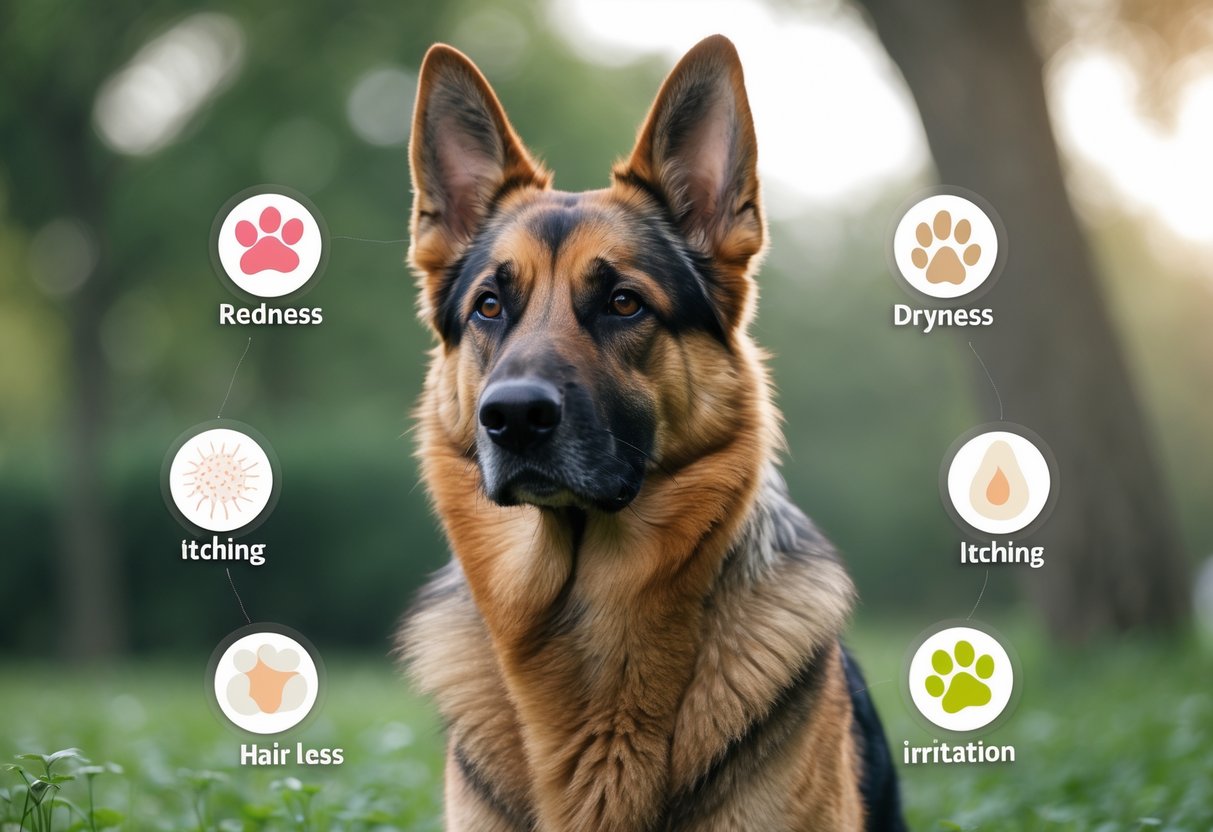
German Shepherds often face skin problems because of their thick coats and genetics. These issues can come from many different factors and show up in various ways. Knowing what causes these problems and spotting early signs helps in managing their skin health effectively.
Causes of Dermatological Problems
Skin problems in German Shepherds usually result from allergies, infections, parasites, or poor nutrition. Allergies to food, pollen, or fleas are common and can cause itching and rashes. Bacterial infections like pyoderma often develop when the skin is already irritated.
Parasites such as mites cause mange, leading to intense itching and hair loss. Over-bathing or using harsh shampoos can dry out their skin. Zinc deficiency and underlying health conditions also contribute to skin issues.
Regular grooming, balanced diet, and preventing flea infestations reduce the risks of these problems.
Recognizing Early Symptoms
Early symptoms of skin problems include scratching, redness, and flaky or dry skin. Owners may notice their German Shepherd licking or biting areas excessively.
Hot spots, which are wet, inflamed patches, appear suddenly and indicate irritation or infection. Hair thinning or bald patches can signal an ongoing issue like mange or allergies.
Changes in behavior, such as restlessness or irritability, often accompany skin discomfort. Detecting these signs early allows for prompt veterinary care and reduces discomfort.
Prevention and Management Strategies
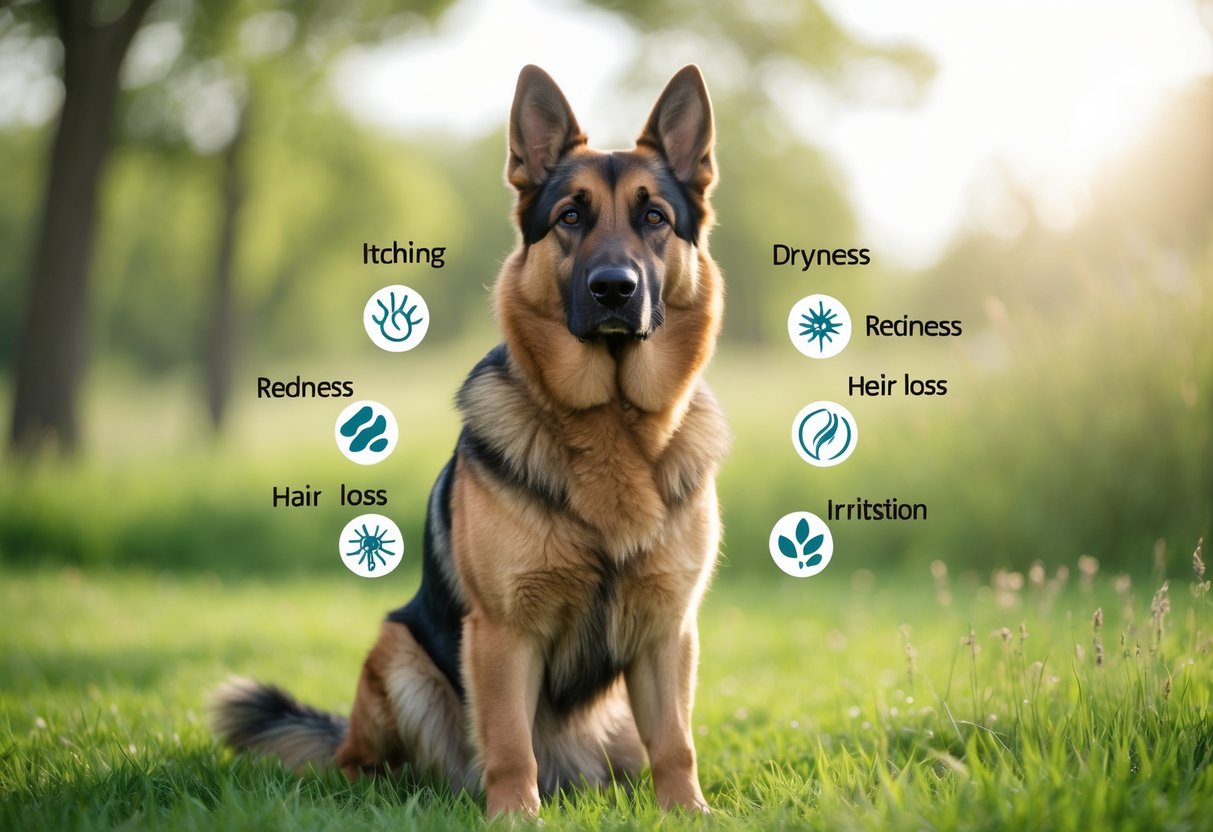
Keeping a German Shepherd’s skin healthy takes regular care and attention. Proper nutrition and consistent grooming help prevent many skin problems. Knowing when to seek veterinary advice is also key to managing issues early and effectively.
Proper Nutrition and Grooming
A balanced diet rich in essential fatty acids, vitamins, and minerals supports healthy skin and a shiny coat. Foods containing omega-3 and omega-6 fatty acids can reduce inflammation and improve skin barrier function.
Regular grooming prevents dirt buildup and removes loose hair, reducing the risk of hot spots and infections. Brushing 2-3 times a week helps keep the coat clean and stimulates natural oil production. Bathing should be done only when necessary using dog-specific shampoos to avoid drying out the skin.
Environmental control is important. Keeping your dog’s bedding clean and avoiding harsh chemicals or allergens reduces irritation. Consistent grooming combined with a healthy diet forms the first line of defense against skin conditions.
When to Consult a Veterinarian
If a German Shepherd shows signs like excessive scratching, red or inflamed skin, patches of hair loss, or recurring hot spots, a vet visit is necessary. Persistent symptoms might indicate allergies, infections, or other underlying health issues.
A veterinarian can diagnose problems accurately with skin tests or allergy screenings. Early treatment helps avoid worsening conditions and discomfort. Follow prescribed medication, such as antibiotics or topical treatments, exactly as directed.
Regular check-ups allow vets to monitor skin health and catch problems early. Professional advice is crucial for adjusting diet, grooming, or treatment plans as the dog’s needs change over time.
Frequently Asked Questions
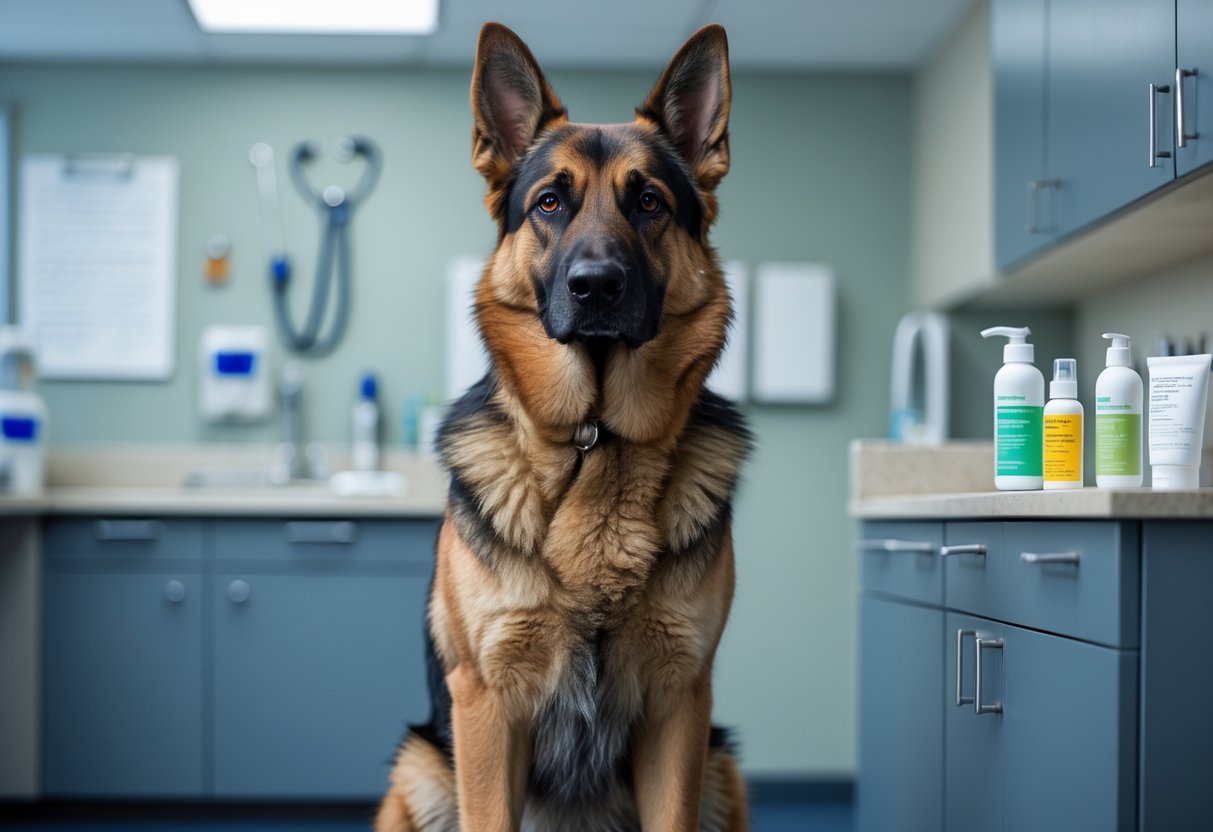
Skin problems in German Shepherds often show distinct signs like redness, pustules, or hair loss. Identifying these issues early and knowing the correct treatment options helps manage their condition and prevent worsening symptoms.
What are common skin conditions in German Shepherds?
Common skin conditions include pyoderma, which is a bacterial infection with redness and pustules. Allergic dermatitis occurs from food or environmental allergies. Hot spots are localized, wet sores that cause irritation. Mange is caused by mites, leading to itching and hair loss. Dry skin often results from poor nutrition or environmental causes.
How can I identify different dog skin diseases with pictures?
Look for specific signs like red patches, sores, flaky skin, or hair loss in photos. Pyoderma shows pustules and inflammation. Hot spots appear as wet, red, and irritated areas. Mange causes thinning hair and intense scratching. Comparing these photos with your dog’s skin can help identify the problem.
What are some effective home remedies for German Shepherd skin issues?
A gentle, fragrance-free shampoo can soothe dry or irritated skin. Applying coconut oil may help with minor dryness and itching. Ensuring a balanced diet rich in omega fatty acids supports healthy skin. However, home remedies should not replace veterinary care for serious infections or persistent problems.
What should I do to treat my German Shepherd’s itchy skin?
First, check for fleas or mites, as these often cause itching. Use vet-recommended shampoos and topical treatments to relieve irritation. Avoid harsh chemicals and maintain regular grooming. If itching persists, a vet visit is important for diagnosis and targeted treatment.
Which treatments are recommended for skin problems in German Shepherds?
Treatments depend on the condition and may include antibiotics for bacterial infections like pyoderma. Antihistamines or steroids can help allergic dermatitis. Mite infestations require specific anti-parasitic medications. Consistent grooming, proper diet, and avoiding irritants are also essential parts of treatment.
How can I manage dry skin in my German Shepherd?
Keep your dog well-hydrated and feed high-quality food with essential fatty acids. Use gentle, moisturizing shampoos during baths. Avoid over-bathing as it can dry out the skin. Regular brushing helps remove dead skin and stimulate natural oils. If dry skin worsens, consult a vet for further care.
